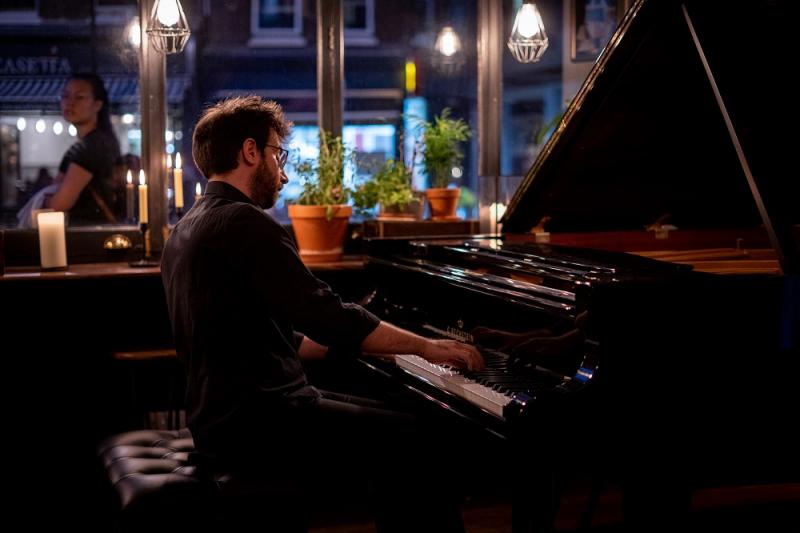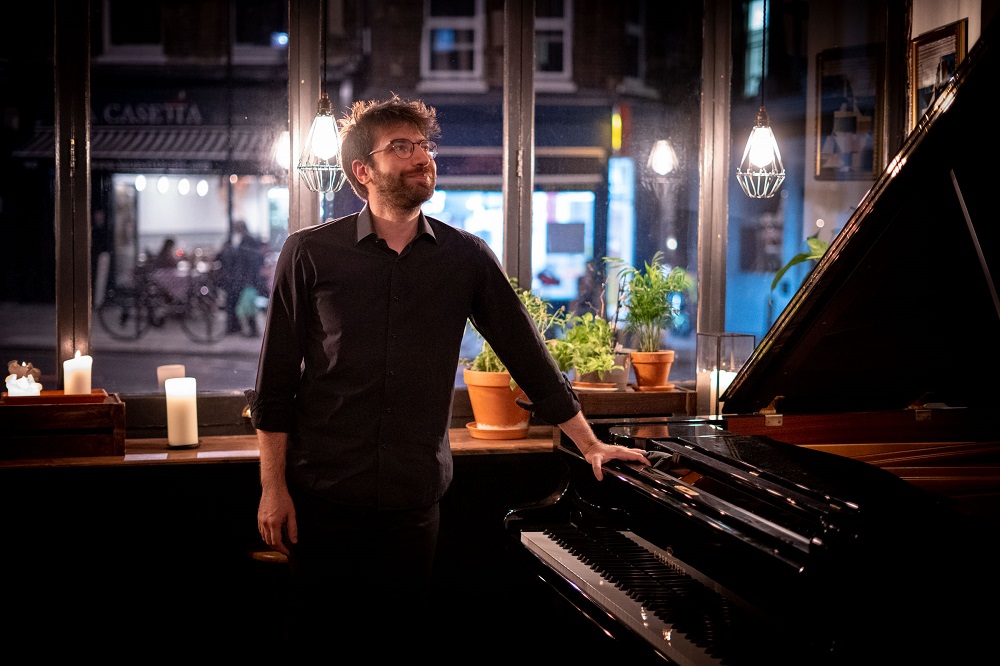Gabriele Carcano, Fidelio Orchestra Cafe - fresh, funny and focused Beethoven | reviews, news & interviews
Gabriele Carcano, Fidelio Orchestra Cafe - fresh, funny and focused Beethoven
Gabriele Carcano, Fidelio Orchestra Cafe - fresh, funny and focused Beethoven
The anniversary composer's wit at its most revelatory in this instalment of a sonatas cycle

Perhaps it’s just the conventional mind which celebrates the pathos, tragedy and triumph in Beethoven’s music at the expense of his humour. And that’s the one aspect of the composer which has been a constant revelation – to me, at any rate – in his anniversary year. Too often the laughs have been solitary, listening to CDs or watching online.
On this evidence, Carcano is the pianist I want to guide me further through the revelations live. His sound is full and direct – you could feel the action of the piano reverberating on the table-top - and most often pedal free, his subtleties infinite but without the imposition of a self-conscious interpretation. Of the three performances I’ve heard this year of the “Tempest” Sonata, Op, 31 No. 2 in D minor, this was the most straightforward, unleashing progressively the biggest yet clearest storms from thoughtful incantations in the first movement. All the same, I’ve note heard the Adagio work in one long unfolding like this before; usually you’re waiting for the heart-easing tune to emerge after all the fragments. That it was exceptionally moving second time around was thanks to the cumulative effect. And the rolling of the waves in the finale was all the more effective after the persistence of the unforeseen in the earlier sonatas of the evening.  There is already a virtue in hearing the “Tempest” in the company of its predecessor. The vocalizings that come out of the spellbinding arpeggios in the first-movement recap are like those of a master singer playing Prospero after the posturings of the Prima Donna in Op. 31 No. 1’s delightfully flabbergasting central aria – a parody, surely, of bel canto show-offery long before Rossini and Bellini got to work (Carcano reminded us that Beethoven was a pupil of Mozart’s rival in opera Salieri). I’d take the comparison even further: the solo becomes a duet when a basso takes up the tune, and the soprano flips into even more elaborate twittering display. It’s a very long aria – the heavier aspect of Beethoven’s humour is that he loves to go on and on – but not without its darker side. Carcano also mentioned Jean Paul’s maxim that humour in music is the art of the unexpected, and one can turn that on its head by asserting that pathos in a humorous context is unexpected too, as it was here.
There is already a virtue in hearing the “Tempest” in the company of its predecessor. The vocalizings that come out of the spellbinding arpeggios in the first-movement recap are like those of a master singer playing Prospero after the posturings of the Prima Donna in Op. 31 No. 1’s delightfully flabbergasting central aria – a parody, surely, of bel canto show-offery long before Rossini and Bellini got to work (Carcano reminded us that Beethoven was a pupil of Mozart’s rival in opera Salieri). I’d take the comparison even further: the solo becomes a duet when a basso takes up the tune, and the soprano flips into even more elaborate twittering display. It’s a very long aria – the heavier aspect of Beethoven’s humour is that he loves to go on and on – but not without its darker side. Carcano also mentioned Jean Paul’s maxim that humour in music is the art of the unexpected, and one can turn that on its head by asserting that pathos in a humorous context is unexpected too, as it was here.
After our audible delight in the witty end of the sonata, Carcano noted what he’d written at the top of the last page of his score, from Alfred Brendel, a sometime mentor. There’s a variant of it in a New York Times interview: “anyone who plays Beethoven's Op. 31, No. 1, and cannot at the very least make listeners smile should become an organist.” On the evidence of this, where every little quirk and insistence, starting with the deliberately out-of-sync left and right hands in the first movement, made its effortlessly funny mark, Carcano will not need to give up the day job and take up the organ.
His opening account of Op. 10 No. 2 in F major similarly made us wonder at the ingenuity of Beethoven’s ever-surprising wit in the outer movements, while the flow of the more serious middle movement justified the encore, a subtly nuanced Schubert Moment musicale No. 3, The human scene beyond the window complemented Beethoven's first finale beautifully – a somewhat comical running figure as the rapid motion of the finale got underway, later mirrored in police sirens and roaring motor bikes heightening the terror of the tempest later in the recital. Everything about these privileged concerts in the café space both connects one to the outside world and heightens one’s sense of it. All this in between energising, life-affirming bouts of Zimerman, Rattle and the LSO in Beethoven concertos at St Luke's (more on that when - hopefully, rather than if - the Barbican Beethoven marathon happens on Thursday). Roll on Carcano’s next instalment, which among other things. will complete the Op 31 series with No. 3.
- Carcano's next Beethoven sonatas recitals are on 19 and 20 January, Full what's on list, from the Doric Quartet tomorrow onwards, here
- Read more classical reviews on theartsdesk
rating
Explore topics
Share this article
The future of Arts Journalism
You can stop theartsdesk.com closing!
We urgently need financing to survive. Our fundraising drive has thus far raised £49,000 but we need to reach £100,000 or we will be forced to close. Please contribute here: https://gofund.me/c3f6033d
And if you can forward this information to anyone who might assist, we’d be grateful.

Subscribe to theartsdesk.com
Thank you for continuing to read our work on theartsdesk.com. For unlimited access to every article in its entirety, including our archive of more than 15,000 pieces, we're asking for £5 per month or £40 per year. We feel it's a very good deal, and hope you do too.
To take a subscription now simply click here.
And if you're looking for that extra gift for a friend or family member, why not treat them to a theartsdesk.com gift subscription?
more Classical music
 Anja Mittermüller, Richard Fu, Wigmore Hall review - a glorious hall debut
The Austrian mezzo shines - at the age of 22
Anja Mittermüller, Richard Fu, Wigmore Hall review - a glorious hall debut
The Austrian mezzo shines - at the age of 22
 First Person: clarinettist Oliver Pashley on the new horizons of The Hermes Experiment's latest album
Compositions by members of this unusual quartet feature for the first time
First Person: clarinettist Oliver Pashley on the new horizons of The Hermes Experiment's latest album
Compositions by members of this unusual quartet feature for the first time
 Gesualdo Passione, Les Arts Florissants, Amala Dior Company, Barbican review - inspired collaboration excavates the music's humanity
At times it was like watching an anarchic religious procession
Gesualdo Passione, Les Arts Florissants, Amala Dior Company, Barbican review - inspired collaboration excavates the music's humanity
At times it was like watching an anarchic religious procession
 Classical CDs: Camels, concrete and cabaret
An influential American composer's 90th birthday box, plus British piano concertos and a father-and-son duo
Classical CDs: Camels, concrete and cabaret
An influential American composer's 90th birthday box, plus British piano concertos and a father-and-son duo
 Cockerham, Manchester Camerata, Sheen, Martin Harris Centre, Manchester review - re-enacting the dawn of modernism
Two UK premieres added to three miniatures from a seminal event of January 1914
Cockerham, Manchester Camerata, Sheen, Martin Harris Centre, Manchester review - re-enacting the dawn of modernism
Two UK premieres added to three miniatures from a seminal event of January 1914
 Kempf, Brno Philharmonic, Davies, Bridgewater Hall, Manchester review - European tradition meets American jazz
Bouncing Czechs enjoy their Gershwin and Brubeck alongside Janáček and Dvořák
Kempf, Brno Philharmonic, Davies, Bridgewater Hall, Manchester review - European tradition meets American jazz
Bouncing Czechs enjoy their Gershwin and Brubeck alongside Janáček and Dvořák
 Solomon, OAE, Butt, QEH review - daft Biblical whitewashing with great choruses
Even a top soprano and mezzo can’t make this Handel paean wholly convincing
Solomon, OAE, Butt, QEH review - daft Biblical whitewashing with great choruses
Even a top soprano and mezzo can’t make this Handel paean wholly convincing
 Two-Piano Gala, Kings Place review - shining constellations
London Piano Festival curators and illustrious friends entertain and enlighten
Two-Piano Gala, Kings Place review - shining constellations
London Piano Festival curators and illustrious friends entertain and enlighten
 Echo Vocal Ensemble, Latto, Union Chapel review - eclectic choral programme garlanded with dance
Beautiful singing at the heart of an imaginative and stylistically varied concert
Echo Vocal Ensemble, Latto, Union Chapel review - eclectic choral programme garlanded with dance
Beautiful singing at the heart of an imaginative and stylistically varied concert
 Scott, Irish Baroque Orchestra, Whelan, RIAM, Dublin review - towards a Mozart masterpiece
Characteristic joy and enlightenment from this team, but a valveless horn brings problems
Scott, Irish Baroque Orchestra, Whelan, RIAM, Dublin review - towards a Mozart masterpiece
Characteristic joy and enlightenment from this team, but a valveless horn brings problems
 Classical CDs: Voice flutes, flugelhorns and froth
Baroque sonatas, English orchestral music and an emotionally-charged vocal recital
Classical CDs: Voice flutes, flugelhorns and froth
Baroque sonatas, English orchestral music and an emotionally-charged vocal recital

Add comment